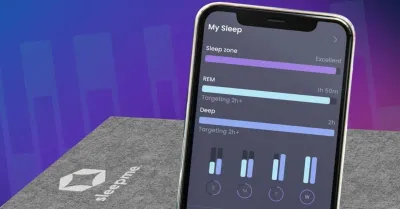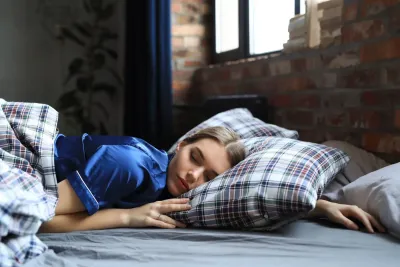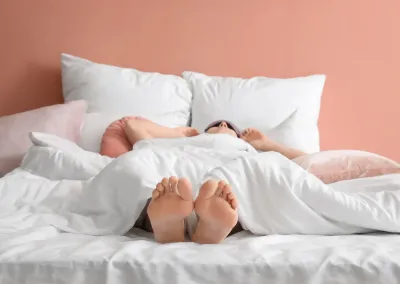
Key Takeaways
Sleep trackers help turn your nights into usable data, giving insight into sleep quality, patterns, and habits that affect how you feel each day.
- A sleep tracker is a device or system that monitors sleep patterns such as duration, stages, movement, heart rate, and recovery signals.
- Trackers come in different forms, including wearables (watches, rings) and non-wearables that monitor sleep passively from your bed.
- Sleep data helps identify trends like inconsistent schedules, poor sleep efficiency, or frequent nighttime disruptions.
- Many sleep trackers pair with apps to provide insights, coaching, and recommendations for improving sleep habits.
- While trackers don’t diagnose sleep disorders, they can be a powerful tool for awareness, habit-building, and informed conversations with healthcare providers.
Not that long ago, figuring out how you slept meant guessing. Maybe you jotted notes in a sleep journal or went all in on a sleep study if things felt really off.
For most people, sleep was a black box. You woke up tired and just assumed that was normal.
Now, tech has stepped in. Sleep trackers give you a clear look at what actually happens between lights out and your alarm. If you are waking up groggy, struggling to focus, or feeling run down, the issue may not be how long you sleep but how well you sleep.
Quality sleep plays a major role in immune health, focus, and long term wellbeing. The challenge is knowing whether your sleep is doing its job.
That is where sleep trackers come in. They collect data to help eliminate the guesswork from real data so you can understand your nights and fix what is holding your sleep back.
What Is a Sleep Tracker?
They are designed to track sleeping patterns, monitor various health aspects, such as HRV, and provide helpful tips to improve the quality and amount of sleep you are receiving each night.
Some provide users feedback based on their sleep performance.
Consumer sleep trackers (CSTs) have gained significant popularity because they enable individuals to conveniently monitor and analyze their sleep.
Sleep the Way You Want
The Chilipad puts temperature control in your hands, giving you personalized comfort all night long. Cooler sleep, deeper rest, better mornings—it’s that simple.
The Different Types of Sleep Trackers
Not all sleep trackers work the same way. The right option depends on how you want to track sleep and how much effort you want to put into wearing or setting up a device.
We'll go over their functions to help you deterine which type is the best sleep tracker for you.
Note: Discover more about the differences between non-wearable and wearable sleep trackers and thier features such as smart alarms and other sleep data collected.
Wearable Sleep Trackers
A wearable sleep tracker can take many forms. The most commonly used wearable trackers include watches, bracelets, and rings.
However, they can also be found as a headband and a chest strap. Most provide smart alarms and other features.
Pros of Wearable Sleep Trackers:
- Tracks sleep along with daytime activity
- Continuous heart rate and recovery data
- Easy to review trends over time
Limitations of Wearable Sleep Trackers:
- Can feel uncomfortable for light sleepers and those with interrupted sleep
- Estimates sleep stages rather than measuring brain activity
- Battery charging is required
Who it is best for: People who want all day health tracking and do not mind wearing a device overnight.
Non-Wearable Bed-Based Sleep Trackers
A non-wearable sleep tracker is often a thin device placed on your mattress in between the mattress and sheets to monitor your sleeping habits. They track sleep using movement, breathing patterns, and heart rate without requiring anything to be worn.
Non-Wearable Tracker Pros:
- No device on the body, doesn't affect sleep
- Passive tracking with minimal setup
- Ideal for tracking sleep environment effects
Limitations of Non-Wearable Sleep Tracker:
- Limited daytime health data
- May struggle with pets or shared beds
- Typically focused only on sleep
Who it is best for: Hot sleepers, light sleepers, and anyone who wants sleep data without wearing tech to bed.
Phone Based Sleep Tracking Apps
Phone based apps use the phone’s microphone and motion sensors to estimate sleep based on movement and sound while the phone rests nearby.
They can be labled called bedside devices, can be placed on a table by the bed or beside where you are sleeping.
Pros of Phone Sleep Tracking Apps:
- No extra hardware required
- Easy entry point for beginner
- Low cost or free options
Limitations:
- Less accurate than dedicated devices
- Limited insight into sleep stages and recovery
- Sensitive to room noise and placement
Who it is best for: People who want a basic overview of sleep habits without investing in a dedicated tracker.
What Does a Sleep Tracker Actually Track?
A sleep tracker does more than count hours in bed. It collects multiple data points throughout the night to show how your body behaves while you sleep.
When viewed together, these health metrics help paint a clearer picture of sleep quality, not just sleep time.
Sleep Duration:
This is the total amount of time you spend asleep each night. Tracking duration helps highlight short sleep, inconsistent bedtimes, and patterns that may be cutting into recovery.
Note: Some sleep experts have recommened to maintain at least 7 - 8 hours of sleep each night. But, keep in mind, quality over sleep quantity.
Monitor Sleep Stages
Most sleep trackers, whether wearables or non-wearables, provide estimates of time spent in light sleep, deep sleep, and REM sleep.
These stages play different roles in physical recovery, memory, and mental focus.
While consumer trackers provide estimates, trends over time are often more useful than any single night.
Looking to learn more. Take a look at our blogs focusing on the different sleep stages: light sleep, deep sleep, and REM sleep.
Sleep Score
A sleep score is a single number that summarizes how well you slept. Most sleep trackers calculate it using a mix of sleep duration, sleep stages, heart rate, restlessness, and consistency.
The exact formula varies by device, but the goal is the same: give you a quick snapshot of sleep quality without digging into every metric.
Sleep scores are most useful for tracking changes over time, not chasing a perfect number. Rising or falling scores often reflect shifts in habits, stress, recovery, or sleep environment.
Heart Rate and Heart Rate Variability
Heart rate shows how hard your body is working during sleep. Heart rate variability reflects how well your nervous system is recovering.
Sleep tracking or fitness trackers, can display the changes. The metrics can signal stress, poor recovery, or improved sleep consistency.
What High Heart Rate Variability Means
A higher heart rate variability during sleep is usually a good sign. It means your nervous system is relaxed and your body is shifting into recovery mode.
Consistently high HRV often shows up when sleep is steady, stress is lower, and your body is adapting well to training or daily demands.
If HRV trends upward over time, it signals that your recovery habits are working.
Movement and Restlessness
Sleep Trackers measure tossing, turning, and nighttime movement. Frequent restlessness may indicate discomfort, overheating, or disrupted sleep cycles.
Breathing Trends
Some sleep trackers monitor breathing patterns during the night. Irregular breathing or changes in respiratory rate can flag potential sleep disruptions worth paying attention to.
Skin Temperature Changes
Certain devices track changes in skin temperature. Fluctuations can offer insight into circadian rhythm shifts, hormonal changes, or whether your sleep environment is too warm or too cool.
Note: How accurate are sleep trackers? It depends on the type of tracker you're using, based on a study in the Journal of Sleep, December 2020
How Accurate Are Sleep Trackers?
Sleep trackers are helpful, but they are not medical devices. Most consumer trackers estimate sleep stages using movement, heart rate, and breathing data rather than direct brain activity.
Because of this, they can identify general sleep patterns, but they cannot precisely measure sleep stages the way clinical tools can.
What matters most is trends over time, not perfect accuracy on a single night. Research shows that while consumer sleep trackers may misclassify specific sleep stages.
They are effective at tracking overall sleep duration and detecting changes in sleep consistency, restlessness, and recovery signals.
If you experience persistent daytime sleepiness, loud snoring, breathing disruptions, or sudden declines in sleep quality, a medical sleep study remains the gold standard.
Sleep trackers work best as an awareness and habit building tool, not a replacement for clinical diagnosis.
The Benefits of Using a Sleep Tracker
An individual using a sleep tracker can experience many benefits from continuous monitoring of sleep habits, quality, and duration, as it allows them to make necessary adjustments to their lifestyle and sleep environment to achieve better sleep.
Of the many benefits to using sleep tracking devices, the most common include:
- Sleep Duration and Quality
- Overnight Health Signals
- Sleep Environment Impact
- Lifestyle Effects on Sleep
Making Sleep Tracking Work for You
Sleep tracking users often appreciate user-friendly graphs and reports that help them understand their sleep patterns and easily recognize trends in their sleeping habits.
If you have any worries about the quality of your sleep, whether it's deep sleep or HRV, it's best to reach out to your doctor.
If you are interested in receiving insights about your sleep routine, a sleep tracker can be a great option.
Sleep Tracker Frequently Asked Questions
Are sleep trackers accurate?
Sleep trackers are accurate for identifying sleep patterns and trends over time. They estimate sleep stages using movement and heart data, not brain activity.
How Accurate Are Sleep Trackers?
Accuracy varies by device. According to a December 2020 study published in the Journal of Sleep, non-wearable sleep trackers can be fairly accurate for total sleep time, but may be less reliable for measuring sleep stages.
What Are the Benefits of Using a Sleep Tracker?
Find out more with a full list of the benefits of a sleep tracker.
- Monitors sleep duration and efficiency
- Identifies patterns and potential disruptions
- Helps detect possible sleep disorders (like insomnia or sleep apnea)
- Encourages better bedtime habits
- Offers data to discuss with your healthcare provider
What matters more than perfect accuracy?
Consistency. Changes in sleep duration, restlessness, and recovery over weeks provide more useful insight than any single night of data.
Can a sleep tracker replace a sleep study?
No. Medical sleep studies are still needed for diagnosing conditions like sleep apnea, narcolepsy, or unexplained chronic fatigue.









